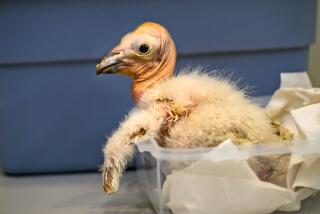Rare golden eagle nest found in Santa Monica Mountains for first time in 30 years
A pair of golden eagle chicks have been found in the Santa Monica Mountains for the first time in nearly three decades, wildlife officials said Wednesday.
A nest discovered in the western portion of the mountain range held a pair of 12-week-old golden eagles, a fully protected species in California, authorities said. The last time a nest was reported in the area was in the late 1980s, near Lobo Canyon.
The National Park Service announced Wednesday that the chicks, a male and a female, were found March 11 when a consultant conducting bird surveys on private property saw the nest. The consultant notified park service officials April 9 about the discovery.
In early May, biologists with the park service, the U.S. Geological Survey and Bloom Biological Inc. confirmed the nest location in a large mountain cave. The chicks were tagged with two ankle bands â one colored and one numbered â that help scientists monitor bird populations.
WATCH: A bald eagle chick born at Big Bear Lake tries to take flight Âť
Scientists who visited the cave said western gulls appeared to be the eagle familyâs food of choice based on remains found in the nest. Park service officials said that although the chicks recently fledged, they will rely on their parents until around late fall, when they learn to hunt on their own.
Golden eagles have historically inhabited the Santa Monica Mountains, but the discovery of the nest is still surprising: Sightings are extremely rare, and the Park Service said a survey of the mountains in the 2000s didnât yield any active nests.
The golden eagle, a cousin of the bald eagle, is one of the largest birds in North America. The park service said biologists think the population, which is protected by the Migratory Bird Treaty Act and the Bald and Golden Eagle Protection Act, may be declining in the U.S., especially in California.
Katy Delaney, an ecologist with the Santa Monica Mountains Recreation Area, a unit of the National Park Service, said humans are the greatest threat to golden eagles. She said the speciesâ range in much of California has been reduced by hunting and a loss of habitat for nesting.
âIn the past, they were trapped and shot throughout their range, and today, they are vulnerable to habitat loss,â Delaney said. âLike their mammalian carnivore counterparts, they can die from eating poisoned prey as well as from lead poisoning, electrocution on power lines and collisions with wind turbines.â
Delaney said that, although officials havenât seen the species in many years, itâs possible the golden eagles may have been in the area but were undetected at a time when fire and drought have besieged the state.
âNonetheless, this is a good thing for our mountains. We not only have mountain lions here, but we have golden eagles too,â Delaney said.
More to Read
Sign up for Essential California
The most important California stories and recommendations in your inbox every morning.
You may occasionally receive promotional content from the Los Angeles Times.











